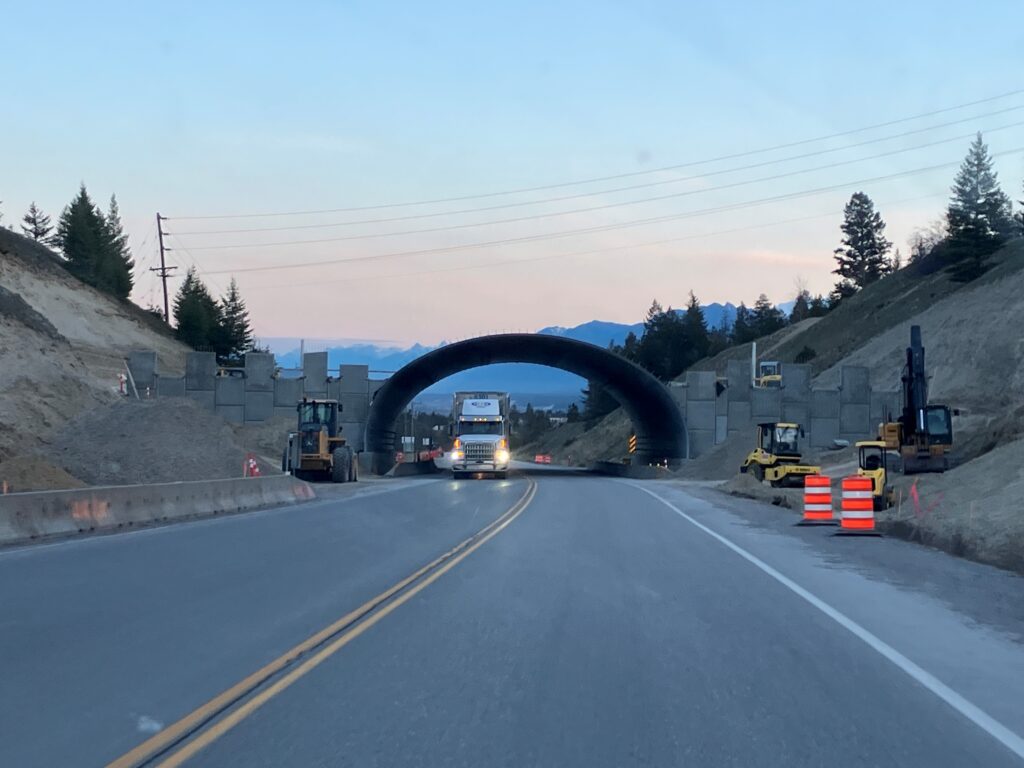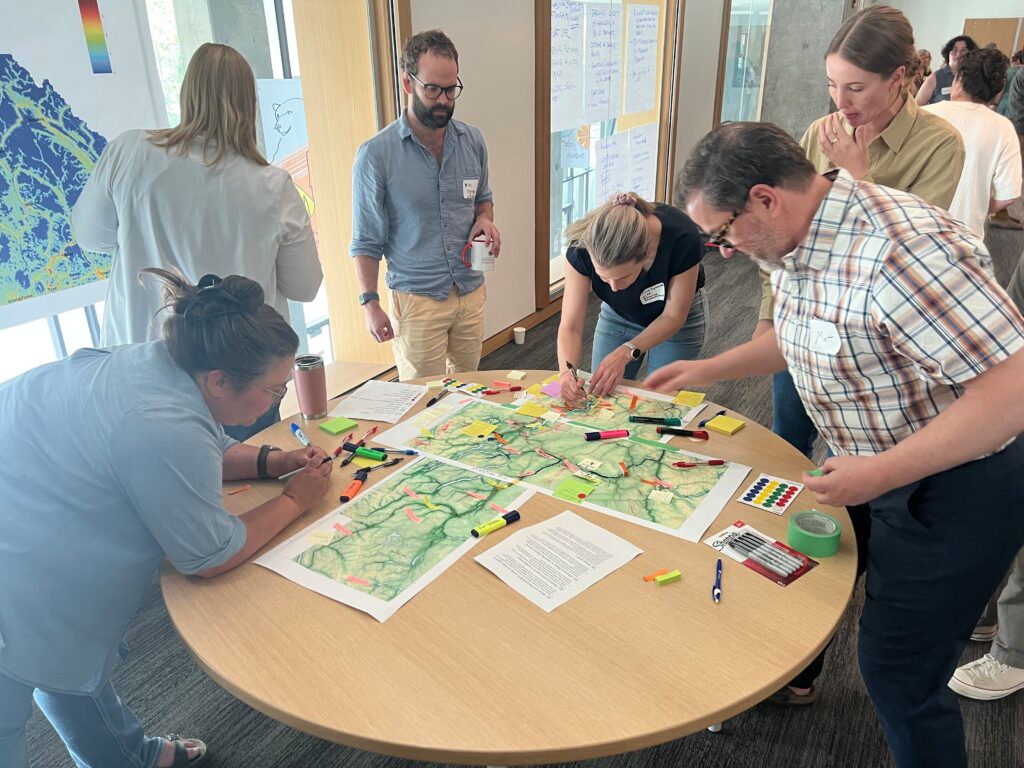From Collisions to Connections: Protecting Biodiversity in BC’s Southern Interior

FOR IMMEDIATE RELEASE
Kelowna, BC — June 18, 2025. A groundbreaking forum in Kelowna at the University of BC’s Okanagan campus brought together representatives from Indigenous communities, government agencies, scientists, and conservationists to tackle one of the most pressing issues facing wildlife today: the loss of habitat connectivity.
From June 11-13, 45 participants gathered to share knowledge and develop solutions for maintaining vital habitat connections across BC’s Southern Interior—natural pathways that allow animals to move safely through their habitats to find food, reproduce, and adapt to a changing environment.
As roads, cities, and resource industries expand, these connections are being severed. This fragmentation of natural areas is a major driver of biodiversity loss, making it harder for species like grizzly bears, elk, bighorn sheep, badgers, and endangered amphibians and reptiles to survive.
“Healthy ecosystems depend on connected landscapes,” says Danielle Toperczer, Program Director of the Thompson-Nicola Conservation Collaborative (TNCC). “When we protect wildlife corridors, we’re not only helping animals—we’re also protecting the clean water, forests, and climate systems that all communities depend on.”
Wildlife-vehicle collisions offer a stark example of the consequences. Each year, nearly 3,000 crashes involving wildlife are reported on Southern Interior highways—though the true number is likely much higher due to underreporting. These accidents threaten human safety, cost millions in damages, and are often fatal for animals.
But there is hope. The forum included site visits to successful initiatives like BC’s first wildlife highway overpass at Trepanier Creek, where infrastructure is helping animals cross roads safely. Participants discussed how to expand these efforts by identifying regional priorities for overpasses, underpasses, and fencing to keep wildlife off busy roads and reconnect habitats.

Wildlife overpass being constructed on highway 95 just south of Radium Hot Springs in April, 2025, to reduce collisions with bighorn sheep
“This work isn’t just about building highway structures—it’s about protecting the natural systems that sustain us,” says Scott Boswell of the Okanagan Collaborative Conservation Program (OCCP). “Restoring habitat connectivity helps prevent further biodiversity loss and supports the long-term health and resilience of wildlife populations.”
Central to the forum was the importance of partnerships, especially with Indigenous communities. Participants emphasized the need for Indigenous-led conservation and the braiding of Indigenous knowledge with Western science to guide future actions.
“Our responsibility is not just to the land but to the tmixw (all living things) who share it,” said Addison Fosbery of Westbank First Nation. “When we honour Syilx laws and skʷəkʷʔə́nəɬp (the responsibility to care for the land)—and work together, we can protect and restore the land so future generations can thrive.”
“This was an important step in strengthening the relationships and partnerships—especially with Indigenous communities and BC’s Ministry of Transportation and Transport —needed to move forward together,” adds Juliet Craig of Kootenay Conservation Program (KCP). “We need to ensure wildlife crossings are placed in the right locations and reflect both the needs of species and the cultural values of the people who have long cared for these lands.”

Participants at the Southern Interior Crossings and Connectivity Forum, Jun 11-13, 2025
The Southern Interior Crossings & Corridors Forum—hosted by the BC Conservation Foundation, UBC Okanagan, and the Ministry of Water, Land and Resource Stewardship—was supported by regional conservation groups including TNCC, OCCP, and KCP. It marks a major step forward in planning and collaboration to reconnect landscapes across the region.
The work happening here is part of a larger vision. These efforts contribute to BC’s draft Biodiversity and Ecosystem Health Framework and tie into continent-wide initiatives like Yellowstone to Yukon and Reconnecting the Rockies—helping to maintain a resilient web of habitats across North America.
As the forum concluded, participants agreed to a clear commitment: to turn ideas into action by strengthening partnerships, aligning goals, and advancing the identification of wildlife crossings and habitat corridors—laying the groundwork for coordinated efforts to reverse biodiversity loss and secure a thriving future for both wildlife and people.
About the Thompson-Nicola Conservation Collaborative (TNCC):
TNCC is a network of partners working together to protect ecological connectivity, biodiversity, and climate resilience in the Thompson-Nicola region. The collaborative supports regional planning, information sharing, and coordinated action across diverse landscapes and jurisdictions.
About the Okanagan Collaborative Conservation Program (OCCP):
OCCP is a partnership of government and non-government organizations that coordinates and implements collaborative conservation initiatives in the Okanagan. Its mission is to sustain biodiversity and ecological processes while supporting the development of livable communities.
About Kootenay Conservation Program (KCP):
KCP is a partnership of over 85 organizations, including conservation groups, land trusts, First Nations, and government agencies, that seeks to cooperatively conserve biodiversity and natural functioning ecosystems of the region. KCP coordinates the Kootenay Connect Priority Places initiative to bring together partners to enhance ecological connectivity across the Kootenays with a focus on climate adaptation and habitat restoration for species at risk.
Media Contacts
Danielle Toperczer
Program Director
Thompson-Nicola Conservation Collaborative
· manager@tnccollaborative.org
· Phone: (250) 308-9352
Scott Boswell
Program Director
Okanagan Collaborative Conservation Program
· occp123@gmail.com
· Phone: (250) 718-4096
Juliet Craig
Director of Strategic Priorities
Kootenay Conservation Program
· juliet@kootenayconservation.ca
· Phone: (250) 352-2260
